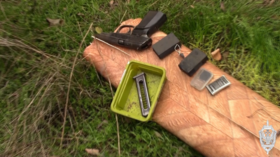Putin talks business in New Delhi
Vladimir Putin has concluded his official visit to India. On Friday, the Russian Prime Minister met with the country’s president and prime minister, and took part in an Internet conference with the Indian public.
According to the Russian Prime Minister, his visit to the country has been married with the most benevolent attitude and readiness to cooperate from the Indian side and a number of important deals have been signed.
“Today, as we have seen, we have signed documents developing our relations in nuclear energy,” Vladimir Putin said in the aftermath of the talks with his Indian counterpart, Manmohan Singh. “We have been actively working in the machine industry, and major Russian companies manufacturing trucks – Ural, KAMAZ – began their production in India,” he added.
The Russian PM went on to say that Russia and India are to continue co-operation in space and moon exploration, and are preparing two Indian astronauts for their launch into space in 2013.
”We also agreed and the relevant document has been signed today about joint work in global satellite navigation,” he added.
Putin said that India and Russia should proceed with their co-operation in the military sector as well. “We confirm our intentions to develop not only trade, but also co-operation in the military technical sphere,” he said.
The prime minister pointed out that the sides are already co-operating in assembling Russian armed vehicles and carrying out joint work on the “Bramos” rocket.
”Today we were talking about continuing co-operation in aviation, including our joint work on the fifth generation jet,” he added.
Addressing the concern of Indian partners, Putin said that Russia is not pursuing any military cooperation with Pakistan.
Vladimir Putin’s Q&A session online
The conference connected the Indian capital with the three biggest Indian cities – Bangalore, Calcutta and Mumbai. During his Q&A session Russian Prime Minister Vladimir Putin has made a note of the correspondence of the political interests of Russia and India.
“With no exaggeration, India is our strategic partner,” Vladimir Putin said. “It’s a reflection not only of the sympathies of our nations, which is also very important, but is a sign of almost full correspondence of our geopolitical interests.”
The main task of this actual stage of bilateral relations is the development of what has been reaped during Soviet era, he added. The prime minister recalled that, with support of the USSR, “the basis for the economic development of India was created”.
Talking about the conference, Vladimir Putin emphasized, that “this is an absolutely unique case and a unique opportunity” to communicate with Indian society and hear opinions on what should be done for the development of the bilateral relations.
Also during the Internet conference, Vladimir Putin claimed that the Russian government is ready to directly support the two countries’ collaboration in the sphere of high-technology.
“Cooperation in high technologies is a priority for Russia and India,”he stated. “The Russian government is ready to support this kind of activity directly, with extra financial measures if necessary,”he added.
As an example of such collaboration, Putin cited work on the GLONASS system.
“Appliance of such systems is multi-faceted and efficient,”he said. Russia and India have a mutual will at a governmental level to develop co-operation in this field. Both countries need support of investment companies from both sides, Putin added.
“Up to now we have been co-operating in a traditional sphere of trade. I and our Indian partners believe it is not enough,” he said.“We should switch to co-operation in high-technology.”
Mutual expectations from the visit
Expectations were high even before Russia’s Prime Minister visited the country.
It is the fifth visit of Vladimir Putin to India, but his first as prime minister. His landmark visit to New Delhi was in 2000, his first year of presidency, and Vladimir Putin is seen in New Delhi as a very special friend to the Indians, as “a co-architect of the strategic partnership between Russia and India,” according to one of the national newspapers.
Russia’s record in providing sophisticated arms and platforms for India is widely praised in the country. Russia is actually the only military supplier from whom India gets high-tech equipment, unavailable from anywhere else, like nuclear powered submarines.
In the nuclear sector, apart from currently building two reactors, Russia is going to build up to 16 nuclear reactors in India.
The visit is also set to boost bilateral trade. At the moment it stands at the point of $8 billion, which is actually well short of its potential. This potential – as well as other topics – was the focus today of a live Internet chat between the Russian prime minister and Indians, who were addressing their questions and perhaps suggestions during the internet conference.
The reactions to the Russian Prime Minister in the Indian press are very welcoming and positive. Today’s newspapers headlines have led with this topic. The biggest newspaper of India, the Hindustan Times, today carries an article by former foreign secretary of India, Kanwal Sibal. It states “At the political level, India and Russia believe in a multipolar world and a rule-based international order. They are opposed to international terrorism and religious extremists.”
“A resurgent Russia is necessary for maintaining a desired level of equilibrium at the global level,” continues the article.“Any form of a US-China diarchy would be at the expense, in particular, of large and autonomous countries like India and Russia.”
Deals signed
All in all, a number of major contracts have been signed during the Russian Prime Minister’s visit to New Delhi.
Among the deals is an intergovernmental agreement on cooperation in peaceful uses of atomic agency and a memorandum on a broader cooperation in the construction of new units of the Indian Kudankulam nuclear power plant.
The plant, with a total capacity of 2,000 megawatt, is currently the main subject of Russia-India atomic energy cooperation.
The countries are also set to form a joint venture, which will provide navigation services in India and produce Glonass/GPS/IRNSS navigation gadgets for civilian consumers.
Russia and India have also signed a new deal on the Vikramaditya aircraft carrier (the former Admiral Gorshkov). It will be delivered to the country in 2012.
Earlier, Russia presented the country with the Admiral Gorshkov’s hull on condition that the ship be modernized in the Russian town of Severodvinsk and equipped with Russia-made fighter jets.
Russia will train the ship’s servicemen and build the necessary infrastructure in the Indian Ocean.
"We also signed a contract on the delivery of 29 Mikoyan MiG-29K ship-based jets," Russian Deputy Prime Minister Sergey Ivanov was quoted by Itar-Tass news agency as saying. "These jets will be based not only on the Admiral Gorshkov but also on other ships."
According to the head of the major Russian aircraft producer, Sukhoi Corporation’s Mikhail Pogosyan, the contract on the delivery of the jets to India is worth $1.5 billion and the deliveries are to start in 2012.
Pogosyan added that an agreement on the joint development of the fifth-generation fighter jet "will be signed within several months." "Negotiations will be over soon, and the contract will be signed," he added.
“India is a big player”
Putin’s visit to India is a continuation of a long-lasting tradition, said Tatyana Shaumyan, head of the Center of Indian Research at the Russian Academy of Sciences' Institute of Oriental Studies.
“Despite some periods of decline after the collapse of the Soviet Union, Russia-India relations are developing,”she said.“I believe the two states are interested in stability in Afghanistan and they are making joint efforts in order to achieve that".
“Even though economic ties are extremely important, our relations are not all about that. In politics, we have common views on many issues and problems the world is facing,” the analyst said. Both Moscow and New Delhi are against a unipolar world. “We are united in our efforts to counter terrorism, which India and Russia have suffered from,”Shaumyan told RT.
“In addition, Moscow supports India in pursuing the UN Security Council permanent membership. In other words, we support the high level that India should occupy [in world politics], taking in account the country’s potential, abilities, activity, its role on the international arena and world economy,” the analyst went on.
Despite some disagreements over nuclear non-proliferation – India has not signed The Treaty on the Non-Proliferation of Nuclear Weapons – the two countries can consolidate on a number of international issues, the Shaumyan believes.
“India’s role in international politics is growing significantly thanks to its economic potential – it is one of the fastest developing economies. Moreover, it has the second-largest population,” she said. “India’s relations with developing countries were, are and will be very active and important. So, the state is a big player. Currently New Delhi actively develops relations with Washington. In spite of existing problems, it develops and promotes ties with China. ”
“What I would like to underline is that current Russian-Indian relations have become less dependant on other directions on our foreign politics. Russia has its ties with other countries. India cooperates actively with the US, China, and the EU. That, however, should not affect our bilateral relationship,” Shaumyan stressed.
Russia and India are like spiritual brothers
The Indian market is probably the only one that is continuing to expand rapidly at the time of the global financial crunch and the Russian share in it is also growing, while other partners of India are losing their niches, Ruslan Pukhov, an expert from the Centre for Analysis of Strategies and Technology, told RT.
The long lasting question of Russia supplying India an air carrier, Admiral Gorshkov, now appears to have been solved and the final deal on it is to be signed, which means that despite the delay, India is “generally satisfied” with the deal, said the observer, who also remarked that there is no such thing as an “air carrier market”, so re-calculation of the price and, therefore, the delay of the project is quite understandable.
“India is probably the most comfortable partner for Russia in terms of geopolitics and economy. We share the same values, we have more or less the same internal threats like Islamic fundamentalism, we also have very good historic background,”Pukhov pointed out.
Ekaterina Koldunova, a political expert from the Moscow Sate University of International Relations, told RT that India, along with the other BRIC countries, cannot be ignored either politically or economically. However, they are still to prove their ability to influence decisions on the international arena, such as those taken by G8 or G20.
The commentator says it will still take a lot from these countries to witness a shift of geopolitical influence away from the West towards the new center, involving Russia, China and India.
“They should have a more balanced interaction from the economic point of view. In this context Russian PM Vladimir Putin’s visit to India shows that Russia does make significant steps to broaden this economic interaction,” commented Koldunova.
Economically, Asian countries did not suffer from the financial crunch as badly as the West. That could make many think that soon they will be able to outdo Western countries in economic growth. However, the analyst points out, the notion of “quality of growth”.
“There are huge internal imbalances in the development of these countries,” says Koldunova.
“The future for China, India and Russia is to change the model of cooperation, and for China and India to move for a new level of economic development, to proceed from the export-oriented model to a more technically-advanced one,” concluded Koldunova.











